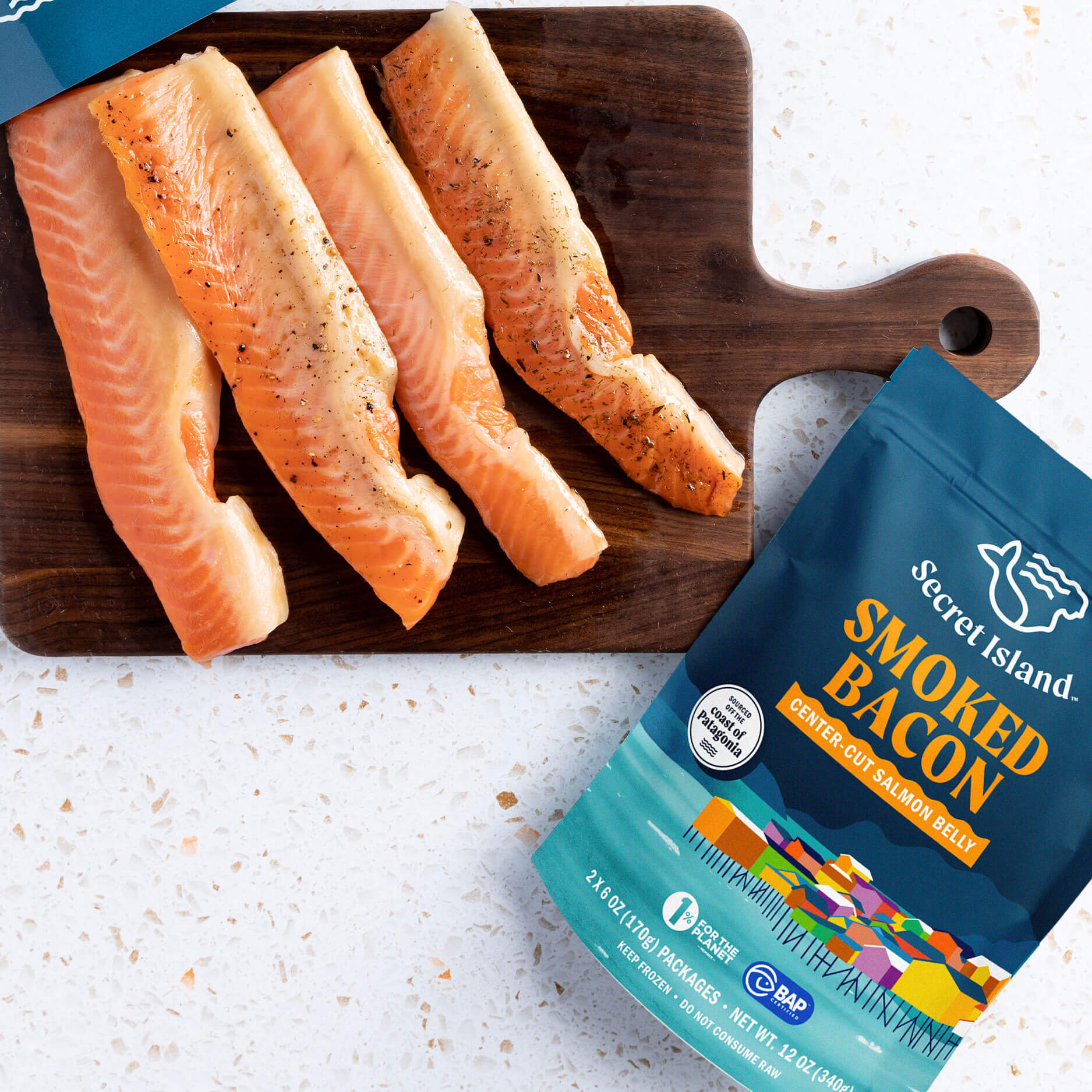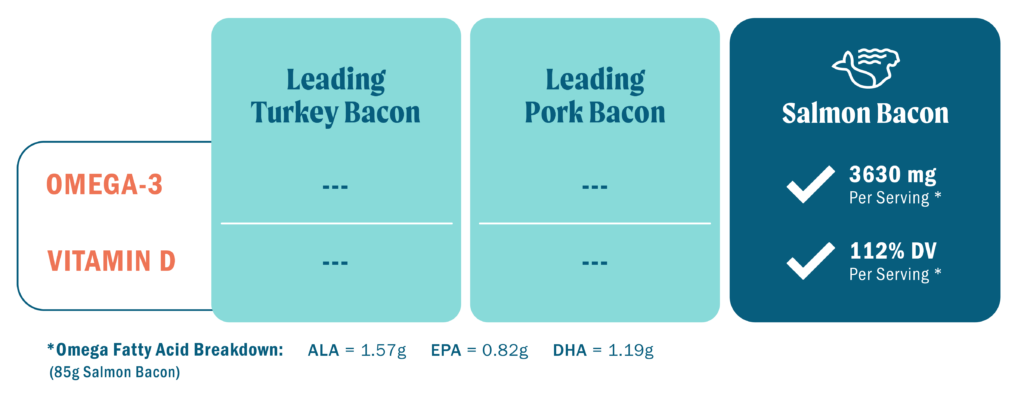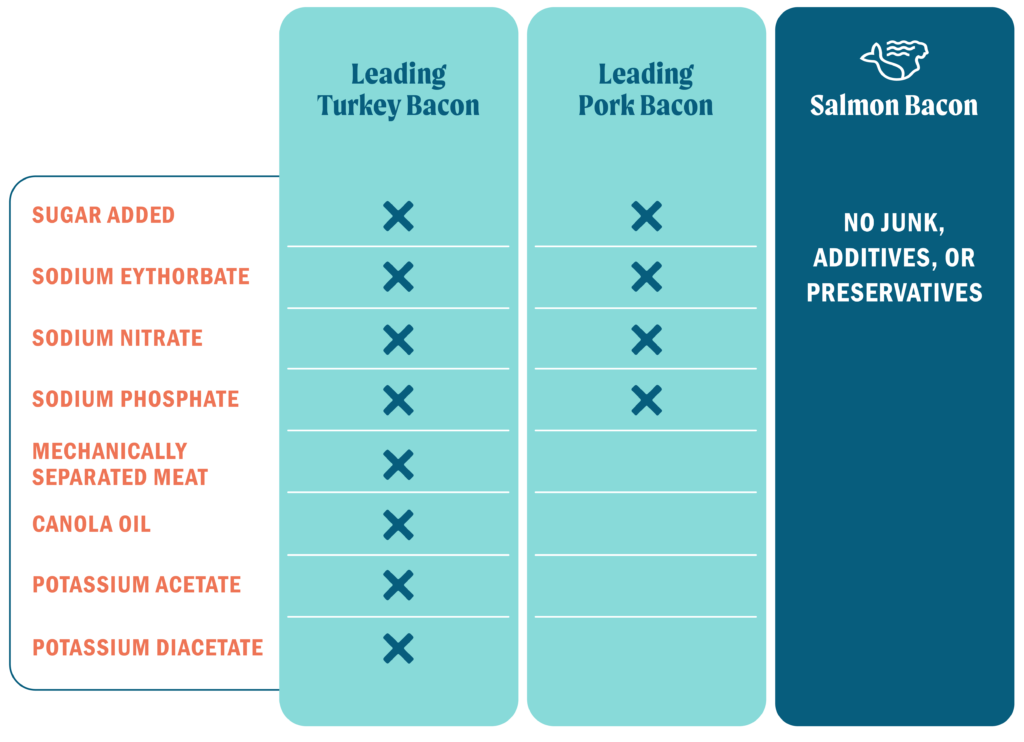
Written by Lourdes Castro, MS, RDN
For those who are health conscious—and even for those who are not—bacon feels like a dietary indulgence. Along the decadent lines of a pint of ice cream or a deep-fried oreo, smokey, salty bacon strips always seem to send taste buds into gustatory tailspins. So much so that it is really hard to stop at the standard serving size of just one or two slices. The only thing that seems to succeed in pumping the brakes and preventing someone from overindulging is the knowledge that pork bacon is a nutritional landmine.
According to the USDA, the term “bacon” is used to describe the cured belly of a swine (hog). However, it can also be made from several different animal species, such as turkey and salmon; thus, its nutritional values can vary dramatically. So should we worry about all types of bacon? Let’s compare.
Ingredients
Several steps are involved in producing bacon. Once the muscle or cut of meat is selected, it is cured (salted) and then smoked. Pork bacon tends to come from pork belly, while turkey bacon is made from mechanically separated turkey, a paste-like product produced by forcing pureed or ground turkey under high pressure through a sieve or similar device to separate the bone from the edible meat tissue. Salmon bacon is simply cut from the filet.
As for curing, both pork and turkey bacon use a variety of industrial salts, often including sodium nitrite, which is used to enhance flavor and color while preventing microbial growth. The jury is out on the long-term health effects of nitrites, but there is evidence that suggests they can enhance the formation of carcinogenic compounds when found in combination with heme-iron, which is found abundantly in red meat (1,2).
On the other hand, Secret Island salmon bacon is made from just three ingredients (salmon, salt, and hardwood smoke), giving it the distinction of a minimally processed food since it contains few unprocessed ingredients (3).
But how do they compare nutritionally? Below is a comparison of pork, turkey, and salmon bacon. Here we need to parse out a few actors, both good and bad.
Nutritional Markers
Let’s start with the problematic nutrients. Saturated fat seems to be linked to many chronic illnesses and conditions such as high cholesterol, heart disease, diabetes, and certain cancers. As such, health experts advise limiting your saturated fat intake as much as possible. While pork bacon has twice as much saturated fat as salmon bacon, turkey bacon is the one with the lowest amount of saturated fat overall.
High sodium intake is also linked to several problematic conditions such as high blood pressure, heart attacks, and strokes. Pork bacon contains 3 times as much sodium per serving as salmon bacon and twice as much as the turkey variety.
On a positive note, omega-3 fatty acids offer plenty of health benefits ranging from promoting brain and heart health to reducing inflammation and protecting against many chronic diseases for both adults and children.
The American Heart Association recommends consuming at least 250 mg of EPA and DHA fatty acids per day (or 1.7 grams per week) to reap the health benefits, with a recent study demonstrating an optimal intake of 2-3 grams/day for those at high risk of cardiovascular disease (4). You can get large amounts of these fatty acids from fatty fish such as salmon and mackerel but you can also derive omega-3 from plant-based sources such as flaxseeds, chia seeds, and walnuts. Salmon bacon is the only bacon that offers omega-3 fatty acids with one 3-ounce serving providing 3 grams!
Optimal dietary choices are made by balancing a variety of factors such as ingredient quality and nutrient density. When you make the calculus on bacon, Secret Island salmon bacon with its 3-ingredients, low sodium quantity, and high amount of omega-3s per serving smokes out its competition. A healthy choice that still feels like an indulgence.
- https://www.hsph.harvard.edu/nutritionsource/2015/11/03/report-says-eating-processed-meat-is-carcinogenic-understanding-the-findings/
- https://www.thelancet.com/journals/lanonc/article/PIIS1470-2045%2815%2900444-1/fulltext
- https://www.cambridge.org/core/journals/public-health-nutrition/article/nutrition-and-health-the-issue-is-not-food-nor-nutrients-so-much-as-processing/0C514FC9DB264538F83D5D34A81BB10A
- https://www.ahajournals.org/doi/full/10.1161/JAHA.121.025071
Why we’re healthier

Why we’re less processed

